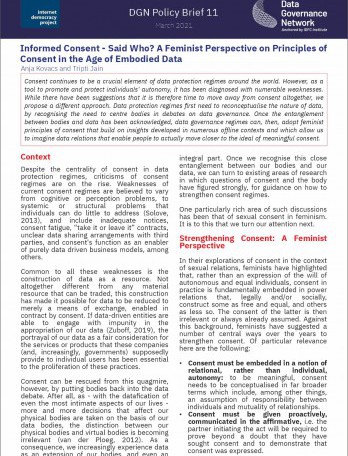

- Privacy
- Data
- Consent
-


-
By Multiple Authors keyboard_arrow_down 19 Mar, 2021




Consent continues to be a crucial element of data protection regimes around the world. However, as a tool to promote and protect individuals' autonomy, it has been diagnosed with numerable weaknesses. While there have been suggestions that it is therefore time to move away from consent altogether, we propose a different approach. Data protection regimes first need to reconceptualise the nature of data, by recognising the need to centre bodies in debates on data governance. Once the entanglement between bodies and data has been acknowledged, data governance regimes can, then, adopt feminist principles of consent that build on insights developed in numerous offline contexts and which allow us to imagine data relations that enable people to actually move closer to the ideal of meaningful consent.